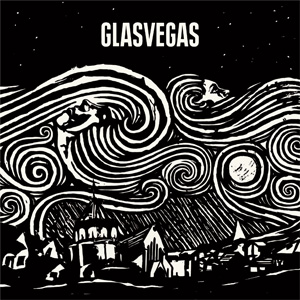Originally released September 8th, 2008. Review originally published September 9th 2008.
Weegie rockers paint a vulgar picture…
Glasvegas debut single “Daddy’s Gone” was that rare thing in 2007, a record which proudly reached back into the dark psyche of the people’s rock and roll, undertaking the journey from The Leader of The Pack to My Bloody Valentine and beyond with a lacquered flourish. Pure drama, lead singer James Allan assumed the role of a teenage son lamenting adolescence with an absent father, the open wound of his rejection partially redeemed against a reverb soaked background that was crafted from sky-scraping guitars and ominous rumbling bass. NME’s record of the year, it also presented itself in the starkest contrast possible to the indie cattle that surrounded it. Bouquets were quick to be tossed at their feet – Alan McGee described the Glasgow quartet as “A cross between The Jesus and Mary Chain and the Ronettes” – but more than that, “Daddy’s Gone” was an entrance on a grand scale, a feeling, not just a slab of fingers and key changes.
If there was one thing missing however, it was context. Without greater understanding, Daddy’s Gone could’ve easily been a renegade song, one whose swimming against the tide philosophy would’ve eventually been forgotten, a fade out ensuring a dusty position on the instant classic shelf. So, there’s a note of relief when a restless year later – the band boldly proposing a Christmas album recorded in a Transylvanian castle – Glasvegas cuddles and connives in exhilarating spades alike. Whilst the punning title of both group and album should be enough of a clue, you’re left in little doubt about the songs bleakly anti-romanticist muse, for this is a record that acts as the ultimate rough guide to the vibrant yet blood spattered pavements and alleyways of their home town.
From the opening moments there’s no quarter asked for or given; opener “Flowers and Football Tops” – about the kidnapping, torture and murder of fourteen-year-old Kriss Donald – is also a Glasvegas signature moment, producer Rich Costey creating an epic space into which punches echo, a thundering rhythm section and guitars which is old and new in the same moment. Allan sings as the boy’s mother, capturing the essence of her grief and the ubiquity of maternal loss in its rawest terms. It even finishes with a moment of the bleakest humour, trailing out with a ragged sounding version of football anthem You Are My Sunshine.
As a moment of amplified emotional dexterity, it’s far from alone. “Its My Own Cheating Heart That Makes Me Cry” could be about the detachment of the serial womaniser, but astutely it chooses to focus on the self-loathing which sometimes auto-revenges a sleazoid’s behaviour. To keep the rain off there’s “Geraldine” – its throbbing chassis as close to indie rock as things get – which is probably the first song ever to be written about a social worker and its likely to remain the best one for a long time. The centrepiece though is “Stabbed”, Allan this time slipping into the skin of a young man about to become the next victim of a gang known as the Baltic Fleeto. In a virtuoso, spoken word performance to the undertow of an appropriated Beethoven’s Moonlight Sonata, he accepts his fate with an almost blithe sense of resignation. It is to his eternal credit that what could have descended into melodramatic self-parody instead produces in the listener an intense feeling of discomfort and revulsion, a dirty hand washing feel of voyeurism.
The cynical have suggested that there would be outrage amongst the nations’ tabloid readers were it a crew of grime MC’s from Deptford that were singing so openly about gang violence and knife culture – as opposed to four leather jacketed white Glaswegians – but they simply aren’t listening. Allan becomes the subject of his songs so totally, he absorbs them in a form of method acting that is an instinct that can’t be taught; a desolate mother, an abandoned son, a dead man walking. It is this almost unnatural gift for both empathy and storytelling which helps Glasvegas achieve the trick of staying on the right of soap opera, but far more importantly in it’s refusal to build an edifice to the violent motifs which are the most affecting moments, it’s the best anti-gang weapon that our “civilised” society would appear to have. This is their truth. It may one day be ours.


1 Comment
Comments are closed.